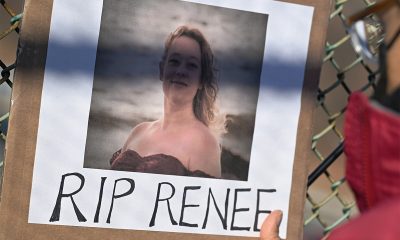Michigan
First LGBTQ statewide official in Mich. seeks re-election
Dana Nessel elected attorney general in 2018

In such a political swing state as Michigan has emerged to be in recent elections, the presence of an out LGBTQ statewide official for the last four years — a first in the state’s history — has been as much of a political anomaly for the region as it’s been a cultural one.
Running for re-election in November after becoming the state’s first LGBTQ candidate to be elected to statewide office, Democratic Michigan Attorney General Dana Nessel has sought to use her office and identity as an out, married lesbian to advocate for LGBTQ equality.
Prior to her run for office, she had been involved in LGBTQ legal advocacy efforts in the state, having served as co-counsel in the 2014 DeBoer v. Snyder case that briefly ruled Michigan’s ban on same-sex marriage unconstitutional in the leadup to the U.S. Supreme Court’s legalization of same-sex marriage nationwide in 2015.
For Nessel, an importance surrounding the representation she has provided to other members of Michigan’s LGBTQ community has remained throughout her first term in office.
Saying Farewell to #PrideMonth. However, all year long: we believe in LGBTQ rights and that love will always win! pic.twitter.com/iAWMXZCJ73
— Michigan Attorney General Dana Nessel (@MIAttyGen) June 30, 2022
“Especially for younger generations, it allows for people to see that you can be an openly gay person and be successful in public life,” Nessel told the Washington Blade. “I have never hid who I was, I made every effort to ensure that people sort of have a little insight into my background and also see my family — [I’m] as proud of my family as any person who’s in an opposite-sex marriage — and to see that you can succeed and you can win a statewide election even in a very purple state as long as you have the right policies and as long as you’re willing to put in the work.”
Defeating then-Michigan House of Representatives Speaker Tom Leonard, Nessel was elected in 2018 as part of a wave of Democratic ascensions to offices across the nation. She ran, in part, on her experience as a prosecutor and one of the state’s top civil rights lawyers on issues relating to LGBTQ equality.
Since then, she has worked with other top officeholders to advance causes involving statewide civil rights efforts and promises made during her initial campaign. Her partnership with officials including Gov. Gretchen Whitmer and Secretary of State Jocelyn Benson has spanned issues ranging from abortion access to defending Michigan election systems in the wake of the 2020 presidential election and subsequent allegations of widespread voter fraud in the state.
Now entering the final months of her re-election campaign against Republican opponent and Kalamazoo attorney Matt DePerno, the attorney general has remained at the epicenter of efforts to establish additional protections for the state’s LGBTQ community. In a case currently pending in the Michigan Supreme Court, Nessel has argued for an interpretation of the language in the state’s Elliot-Larsen Civil Rights Act to expand its prohibition on discrimination to include an individual’s sexual orientation and gender identity.
Given the state’s history with regard to progress on LGBTQ rights, the importance of such litigation and the attorney general’s role, Nessel said, remains paramount.
“If you look at Michigan, every right that an LGBTQ person has in this state was won in a court battle because, legislatively, we’ve never passed anything that was helpful to the [LGBTQ] community, only laws that are harmful to the community,” Nessel said.
@MIAttyGen @MIAttyGen enjoyed attending @MIPride at the State Capitol today! #PrideMonth pic.twitter.com/zz7KlGYpFk
— Michigan Attorney General Dana Nessel (@MIAttyGen) June 26, 2022
But following the U.S. Supreme Court’s decision in Dobbs v. Jackson Women’s Health Organization to overturn the nationwide right to abortion, Nessel says she is also prepared to stand against challenges to Michigan residents’ rights to privacy in other areas including sexual intimacy.
AG Nessel released a statement on #DobbsvJackson:
— Michigan Attorney General Dana Nessel (@MIAttyGen) June 24, 2022
“The overturning of Roe is not just the loss of a right; it is the erosion of our status as equal citizens under the law. As a nation, we trust in our highest court to hold sacred their duty, free from political whim…
“I will continue to fight for a women’s right to choose with the full weight of my office. Michigan residents must continue to fight for reproductive rights at the ballot box in November.”
— Michigan Attorney General Dana Nessel (@MIAttyGen) June 24, 2022
Statement in full: https://t.co/oxjCoxO7o8
In the event of the Supreme Court ruling to overturn its 2003 decision in Lawrence v. Texas that established a nationwide right to same-sex intimacy and privacy regarding consensual sex acts, Nessel said that she would take multiple approaches to ensuring the right — which would affect both same- and opposite-sex couples’ ability to engage in certain private sex acts — remained.
“If Lawrence v. Texas were overturned, it’s not just that I would fight, whether testifying before the legislature or using the bully pulpit to talk about how egregious the thought is of being able to basically prosecute people for something that takes place in the privacy of their own bedroom with another consenting adult and how horrendous that is,” Nessel said. “But then, I myself would refuse to prosecute any sodomy cases.”
With the attorney general’s position as the state’s top law enforcement official, charged with bringing cases in the courts on behalf of the state, critics have characterized such moves as a neglect of duty.
Following the announcement in late June of the Supreme Court’s ruling in Dobbs, DePerno released a statement criticizing Nessel’s messaging that she would not prosecute abortion-related cases should the practice once again become criminalized in the state.
“It is deeply troubling that Dana Nessel pledged to not enforce the opinion of the Supreme Court even before their announcement this morning,” DePerno said. “We cannot have an attorney general who believes she is better than the Supreme Court and the law.”
Pointing to laws rarely tried by county or state prosecutors, such as Michigan’s ban on adultery, Nessel, however, argued that such is a matter of prioritizing her department’s resources to best serve and aid her constituents.
“There are so many laws on the books that it’s your prosecutorial discretion as to whether or not you want to bring those cases,” Nessel said. “To me, my priority is protecting the health, the safety and the welfare of my constituents and prosecuting abortion cases — that’s going to jeopardize the lives of women and not assist them. Prosecuting sodomy cases — I don’t know who I’m benefiting if I were to engage in that.”
In the face of vast legal uncertainty that has now gripped the nation, coupled with a looming election day in November, she said that she intends to continue doing such.
“I expect my office to be very active in protecting LGBTQ rights which is what we’ve done since literally the minute I took office,” Nessel said.
The most recent WDIV/Detroit News polling conducted in early July currently places Nessel with a seven-point lead over DePerno, with almost 17 percent of voters undecided.
Michigan
FBI thwarts Halloween terror plot targeting Mich. LGBTQ bars
Two suspects arrested with arsenal of weapons and tactical gear

By SARAH BRICKER HUNT | Two men are facing federal terrorism charges after allegedly planning a Halloween attack on LGBTQ+ bars in Ferndale, according to criminal complaints unsealed in federal court Nov. 3.
Momed Ali and Majed Mahmoud were arrested Oct. 31 by the FBI Joint Terrorism Task Force, which seized tactical gear, AR-15-style rifles, ammunition and other evidence from a Dearborn home and an Inkster storage unit. The 72-page complaint says the men, along with other co-conspirators including a minor, were inspired by Islamic State extremism and had scouted LGBTQ+ venues in Ferndale.
According to the New York Post, the suspects discussed copying the November 2015 coordinated ISIS attacks in Paris that killed 130 people. Surveillance footage from gun ranges shows Ali and Mahmoud practicing shooting with firearms, the Post reports.
The Paris attacks involved gunmen and suicide bombers who launched coordinated assaults on multiple locations throughout the French capital, including the Bataclan concert hall, the Stade de France stadium and several restaurants and cafes. The Bataclan attack was the deadliest, with attackers opening fire on concertgoers and taking hostages.
Multiple media outlets are reporting that the suspects discussed doing “the same thing as France” in reference to the Paris attacks, and mentioned potential attacks at clubs or discos similar to the 2016 Pulse nightclub shooting in Orlando that killed 49 people. Investigators discovered the suspects repeatedly referred to “pumpkins” in their conversations, which authorities identified as code for a Halloween-themed attack.
Ali purchased a shotgun, an AR-15-style rifle and a forced reset trigger that increases the rate of fire in semiautomatic weapons, according to federal documents. Mahmoud purchased an AR-15-style rifle and more than 1,600 rounds of ammunition.
In September, Ali, Mahmoud and the minor made multiple trips to Ferndale, traveling to an area on Woodward Avenue near East Nine Mile that includes numerous clubs and bars that attract members of the LGBTQ+ community, according to the FBI.
“Our American heroes prevented a terror attack,” U.S. Attorney General Pam Bondi said on X following the arrests.
Both men have been charged with receiving and transferring guns and ammunition for terrorism and appeared in court Nov. 3. One defense attorney declined to comment, while another dismissed the allegations over the weekend as “hysteria” and “fearmongering.”
Popular Ferndale LGBTQ+ bar Soho posted to Facebook following news of the arrests.
“Soho is aware of recent reports concerning a potential threat directed toward businesses in our area. While it appears we were not targeted directly, we commend and deeply appreciate the swift and thorough response of local and federal law enforcement agencies in addressing the matter and ensuring the safety of our community,” the statement read.
The bar emphasized its confidence in local law enforcement. “We have always felt safe in the Ferndale community thanks to our close relationship with local law enforcement and their ongoing diligence and support.”
Soho’s statement also condemned targeting the LGBTQ+ community: “It is abhorrent that the LGBTQ+ community would ever be targeted — a community that stands for tolerance, unity, and peace.”
The bar confirmed its operations continue as normal and expressed gratitude for community support.
Meanwhile, Oakland County Executive Dave Coulter posted to Facebook, “Learning that Ferndale and the LGBTQ+ community were among the potential targets of a terrorist attack is disturbing. The pain of the Pulse Nightclub tragedy in Orlando nine years ago while I was serving as mayor of Ferndale is still deeply felt in the community. I’m grateful for the FBI, Oakland County Sheriff’s Office and other law enforcement for their diligence in seeking out and preventing what could have been another mass tragedy.”
Michigan
Mich. lawmaker introduces resolution asking SCOTUS to overturn Obergefell
Far-right lawmaker stripped from committee assignments for extreme rhetoric

Republican Michigan state Rep. Josh Schriver introduced a resolution Tuesday asking the U.S. Supreme Court to overturn the 2015 Obergefell v. Hodges ruling, which established the nationwide right to same-sex marriage.
The lawmaker announced the move in a post on X, having previously shared a press release announcing plans to file the resolution, which argues that same-sex marriage is “at odds with the sanctity of marriage, the Michigan constitution, and principles upon which the country was established.”
The Resolution to Restore Marriage
— Rep. Josh Schriver (@JoshuaSchriver) February 25, 2025
✅ Introduced pic.twitter.com/UrX1zSdmUf
Schriver’s resolution has 12 co-sponsors, and similar measures have been introduced in other states including Idaho, Iowa, Montana, North Dakota, and South Dakota.
Responding to one of his posts advocating for the overturning of Obergefell in December, Michigan Gov. Gretchen Whitmer, a Democrat, said “any attempt to strip away gay marriage is wrong.”
Last month, the far-right politician was heard telling colleagues in leaked audio that gender affirming healthcare should be banned for minors as well as adults: “If we are going to stop this for anyone under 18, why not apply it for anyone over 18? It’s harmful across the board and that’s something we need to take into consideration in terms of the endgame.”
Earlier this month, he proposed banning birth control and reposted a message promoting the white nationalist Great Replacement conspiracy theory, the latter leading to Michigan House Minority Leader Matt Hall’s (R) decision to remove Schriver from his committee assignments.
Michigan
Mich. Democrats spar over LGBTQ-inclusive hate crimes law
Lawmakers disagree on just what kind of statute to pass

Michigan could soon become the latest state to pass an LGBTQ-inclusive hate crime law, but the state’s Democratic lawmakers disagree on just what kind of law they should pass.
Currently, Michigan’s Ethnic Intimidation Act only offers limited protections to victims of crime motivated by their “race, color, religion, gender, or national origin.” Bills proposed by Democratic lawmakers expand the list to include “actual or perceived race, color, religion, gender, sexual orientation, gender identity or expression, ethnicity, physical or mental disability, age, national origin, or association or affiliation with any such individuals.”
Democratic Gov. Gretchen Whitmer and Attorney General Dana Nessel have both advocated for a hate crime law, but house and senate Democrats have each passed different hate crimes packages, and Nessel has blasted both as being too weak.
Under the house proposal that passed last year (House Bill 4474), a first offense would be punishable with a $2,000 fine, up to two years in prison, or both. Penalties double for a second offense, and if a gun or other dangerous weapons is involved, the maximum penalty is six years in prison and a fine of $7,500.
But that proposal stalled when it reached the senate, after far-right news outlets and Fox News reported misinformation that the bill only protected LGBTQ people and would make misgendering a trans person a crime. State Rep. Noah Arbit, the bill’s sponsor, was also made the subject of a recall effort, which ultimately failed.
Arbit submitted a new version of the bill (House Bill 5288) that added sections clarifying that misgendering a person, “intentionally or unintentionally” is not a hate crime, although the latest version (House Bill 5400) of the bill omits this language.
That bill has since stalled in a house committee, in part because the Democrats lost their house majority last November, when two Democratic representatives resigned after being elected mayors. The Democrats regained their house majority last night by winning two special elections.
Meanwhile, the senate passed a different package of hate crime bills sponsored by state Sen. Sylvia Santana (Senate Bill 600) in March that includes much lighter sentences, as well as a clause ensuring that misgendering a person is not a hate crime.
Under the senate bill, if the first offense is only a threat, it would be a misdemeanor punishable by one year in prison and up to $1,000 fine. A subsequent offense or first violent hate crime, including stalking, would be a felony that attracts double the punishment.
Multiple calls and emails from the Washington Blade to both Arbit and Santana requesting comment on the bills for this story went unanswered.
The attorney general’s office sent a statement to the Blade supporting stronger hate crime legislation.
“As a career prosecutor, [Nessel] has seen firsthand how the state’s weak Ethnic Intimidation Act (not updated since the late 1980’s) does not allow for meaningful law enforcement and court intervention before threats become violent and deadly, nor does it consider significant bases for bias. It is our hope that the legislature will pass robust, much-needed updates to this statute,” the statement says.
But Nessel, who has herself been the victim of racially motivated threats, has also blasted all of the bills presented by Democrats as not going far enough.
“Two years is nothing … Why not just give them a parking ticket?” Nessel told Bridge Michigan.
Nessel blames a bizarre alliance far-right and far-left forces that have doomed tougher laws.
“You have this confluence of forces on the far right … this insistence that the First Amendment protects this language, or that the Second Amendment protects the ability to possess firearms under almost any and all circumstances,” Nessel said. “But then you also have the far left that argues basically no one should go to jail or prison for any offense ever.”
The legislature did manage to pass an “institutional desecration” law last year that penalizes hate-motivated vandalism to churches, schools, museums, and community centers, and is LGBTQ-inclusive.
According to data from the U.S. Department of Justice, reported hate crime incidents have been skyrocketing, with attacks motivated by sexual orientation surging by 70 percent from 2020 to 2022, the last year for which data is available.
Twenty-two states, D.C., Puerto Rico, and the U.S. Virgin Islands have passed LGBTQ-inclusive hate crime laws. Another 11 states have hate crime laws that include protections for “sexual orientation” but not “gender identity.”
Michigan Democrats have advanced several key LGBTQ rights priorities since they took unified control of the legislature in 2023. A long-stalled comprehensive anti-discrimination law was passed last year, as did a conversion therapy ban. Last month the legislature updated family law to make surrogacy easier for all couples, including same-sex couples.
A bill to ban the “gay panic” defense has passed the state house and was due for a Senate committee hearing on Wednesday.
-

 U.S. Supreme Court4 days ago
U.S. Supreme Court4 days agoSupreme Court hears arguments in two critical cases on trans sports bans
-

 Photos5 days ago
Photos5 days agoPHOTOS: ‘ICE Out For Good’ Sunday protests
-

 Virginia5 days ago
Virginia5 days agoMark Levine running in ‘firehouse’ Democratic primary to succeed Adam Ebbin
-

 Arts & Entertainment5 days ago
Arts & Entertainment5 days agoTeyana Taylor, Erin Doherty have big night at Golden Globes




















